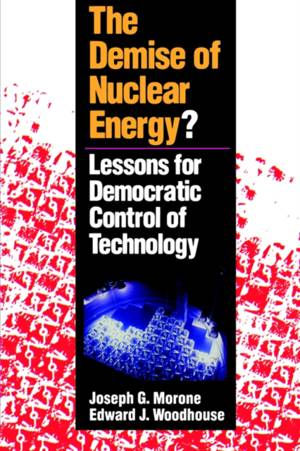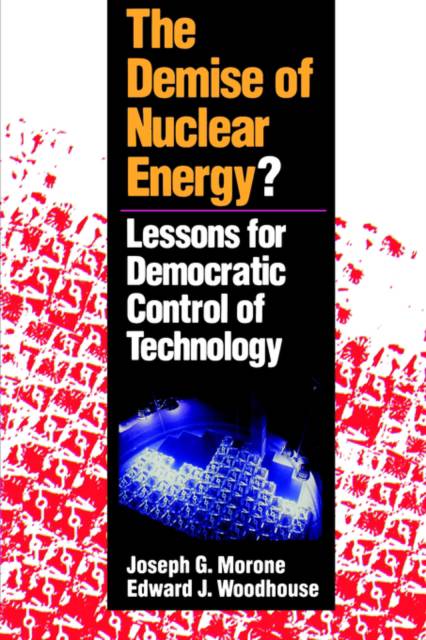
En raison d'une grêve chez bpost, votre commande pourrait être retardée. Vous avez besoin d’un livre rapidement ? Nos magasins vous accueillent à bras ouverts !
- Retrait gratuit dans votre magasin Club
- 7.000.000 titres dans notre catalogue
- Payer en toute sécurité
- Toujours un magasin près de chez vous
En raison de la grêve chez bpost, votre commande pourrait être retardée. Vous avez besoin d’un livre rapidement ? Nos magasins vous accueillent à bras ouverts !
- Retrait gratuit dans votre magasin Club
- 7.000.0000 titres dans notre catalogue
- Payer en toute sécurité
- Toujours un magasin près de chez vous
The Demise of Nuclear Energy?
Lessons for Democratic Control of Technology
Joseph G Morone, Edward J Woodhouse
45,95 €
+ 91 points
Description
Three Mile Island, Seabrook, Diablo Canyon: their controversies have come to symbolize the unhappy fate of American nuclear power. Three decades of effort and an investment of several hundred billion dollars have culminated in wide-spread public fear, huge financial losses, an unworkable regulatory system, and a virtual ban on new reactors. How did one of the world's most flexible political and economic systems produce such a technological white elephant? What does this enormous failure reveal about the compatibility of democracy and technology? And what lessons can be learned for future energy policy making?
To answer these questions, Joseph Morone and Edward Woodhouse offer a nonpartisan diagnosis of the decision-making processes that led to the industry's current state. What we think of as nuclear power, they argue, is just one of many technical and organizational forms this energy source could have taken. It was shaped by political and economic choices of the 1950s and 1960s, not by any internal dynamic of the technology. If a few of those choices had been made differently--particularly regarding the scale-up and diffusion of reactors--the nuclear enterprise might have evolved far more acceptably. The ills of the first nuclear era stemmed not from any fundamental incompatibility between technology and democracy, but from a failure of democracy to live up to its own standards of good decision making.
Although many nations have turned away from civilian nuclear power, problems with fossil fuels--particularly climate changes from the greenhouse effect--may lead to reappraisal of the nuclear option. A radically altered form of nuclear power, together with alternative energy sources and intensified conservation, could provide a more acceptable and less environmentally destructive energy future--if we learn from the failures of the first nuclear era.
To answer these questions, Joseph Morone and Edward Woodhouse offer a nonpartisan diagnosis of the decision-making processes that led to the industry's current state. What we think of as nuclear power, they argue, is just one of many technical and organizational forms this energy source could have taken. It was shaped by political and economic choices of the 1950s and 1960s, not by any internal dynamic of the technology. If a few of those choices had been made differently--particularly regarding the scale-up and diffusion of reactors--the nuclear enterprise might have evolved far more acceptably. The ills of the first nuclear era stemmed not from any fundamental incompatibility between technology and democracy, but from a failure of democracy to live up to its own standards of good decision making.
Although many nations have turned away from civilian nuclear power, problems with fossil fuels--particularly climate changes from the greenhouse effect--may lead to reappraisal of the nuclear option. A radically altered form of nuclear power, together with alternative energy sources and intensified conservation, could provide a more acceptable and less environmentally destructive energy future--if we learn from the failures of the first nuclear era.
Spécifications
Parties prenantes
- Auteur(s) :
- Editeur:
Contenu
- Nombre de pages :
- 168
- Langue:
- Anglais
- Collection :
Caractéristiques
- EAN:
- 9780300044492
- Date de parution :
- 10-09-89
- Format:
- Livre broché
- Format numérique:
- Trade paperback (VS)
- Dimensions :
- 156 mm x 234 mm
- Poids :
- 290 g

Les avis
Nous publions uniquement les avis qui respectent les conditions requises. Consultez nos conditions pour les avis.






